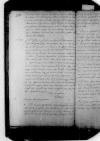Letter #5745
Alfonso de VALDÉS to Ioannes DANTISCUSPalencia, [1527]-09-12
English register:
Valdés is pleased that his actions have won Dantiscus’s acceptance. Dantiscus can always count on him. Valdés will follow Dantiscus’s advice regarding the old man [Chancellor Gattinara]. In this situation, he thinks his coming to Palencia proved to be very much needed. He prefers to recount the whole matter to Dantiscus face to face. He doubts peace will be made with France quickly as some in Palencia hope. He thinks the French move is an attempt to divert the emperor’s attention from Italy. There is no news from Hungary or Genoa. He has found comfortable accommodation, he offers it to Dantiscus, too, if he were to come.
| received Paredes de Nava, [1527]-09-12 Manuscript sources:
Auxiliary sources:
Prints:
| ||||||||||||||||||||
Text & apparatus & commentary Plain text Text & commentary Text & apparatus Excerpts concerning Dantiscus' travels
Clarissimo viro domino
Salutem plurimam.
Gaudeo, si quid feci aut facio, quod tibi
placeat, measque litteras tibi gratas fuisse habeo gratiam, tua enim
humanitate adeo me tibi devinxisti, ut si omnia a me officia tibi
promiseris, iure tuo facturus sis. De
Postscript:
De pace nihil spero futurum.
Tuus ex animo
